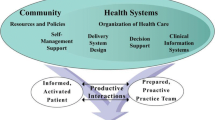Abstract
The rapid growth of medical knowledge during the past few decades has created many potential advances in the therapeutics of chronic disease, and cardiovascular disease has been at the center of this phenomenon. Translation of these advances into everyday care of patients with chronic disease continues to be problematic. Guideline development has emerged as a major strategy to improve utilization of new and existing therapeutic modalities of proven benefit. To be effective, practice guidelines must not only clearly delineate which therapies are efficacious, but also consider the many practical aspects necessary for implementation of specific therapeutics in the actual care of patients. In this way, both the art and the science of medicine can be employed to obtain better patient outcomes in cardiovascular diseases long associated with severe mortality, morbidity, and poor quality of life. This review examines the difficulties inherent in translating new advances into standards of care. The recent guideline process for a specific chronic cardiovascular disease, heart failure, is used for illustration of the translation process.
Similar content being viewed by others
References and Recommended Reading
Woolf SH: Practice guidelines: a new reality in medicine. Arch Intern Med 1990, 150:1811–1818.
Wenneberg J, Gittelsohn A: Small area variations in health care delivery. Science 1973, 182:1102–1108.
Guideline Committee for the Heart Failure Society of America: HFSA guidelines for the management of patients with heart failure caused by left ventricular systolic dysfunction — pharmacological approaches. J Card Fail 1999, 5:357–382. Latest published guideline for management of patients with heart failure due to systolic dysfunction. Describes in detail latest information regarding b-blockade as critical element of optimal heart failure care. Also covers advances in related to aldosterone antagonists, antiarrhythmic and angiotensin II receptor antagonists.
Shaneyfelt TM, Mayo-Smith MF, Rothwangl J: Are guidelines following guidelines? The methodological quality of clinical practice guidelines in the peer-reviewed medical literature. JAMA 1999, 281:1900–1905. Discusses many aspects related to the quality of guidelines developed for clinical conditions. Proposes criteria for evaluating the adequacy of various guideline efforts.
Yusuf S, Cairns JA, Camm AJ, et al.: Grading of recommendations and levels of evidence used in Evidence Based Cardiology. In Evidence based cardiology. Edited by Yusuf S, Cairns JA, Camm AJ, et al. London: BMJ Books; 1998:xxvi.
Califf RM: Considerations in the design, conduct, and interpretation of quantitative clinical evidence. In Comprehensive cardiovascular medicine. Edited by Topol EJ. Philadelphia: Lippincott-Raven; 1998:1203–1221. Excellent presentation of issues related to the design, conduct, and interpretation of clinical trial data as exemplified by research in the management of cardiovascular diseases. Detailed discussion of statistical issues related to analysis of trial data. Also an excellent discussion of how to apply clinical trial data to practice.
Konstam MA, Dracup K, Baker D, et al.: Heart Failure: Evaluation and Care of Patients With Left Ventricular Systolic Dysfunction. Rockville, MD: Agency for Health Care Policy and Research, US Deptartment of Health and Human Services; 1994.
ACC/AHA Task Force on Practice Guidelines: Guidelines for the evaluation and management of heart failure. Circulation 1995, 92:2764–2784.
Task Force of the Working Group for Heart Failure of the European Society of Cardiology: The treatment of heart failure. Eur Heart J 1997, 18:736–753.
Packer M, Cohn JN, for the Steering Committee and Membership of the Advisory Council to Improve Outcomes Nationwide in Heart Failure: Consensus recommendations for the management of chronic heart failure. Am J Cardiol 1999, 83(S):1A-38A.
Bristow MR, Ginsburg R, Fowler M, et al.: b1- and b2-adrenergic receptor subpopulations in normal and failing human ventricular myocardium: coupling of both receptor subtypes to muscle contraction and selection b1-receptor downregulaton in heart failure. Circ Res 1986, 59:297–309.
Mann DL, Kent RL, Parsons B, Cooper G: Adrenergic effects on the biology of the adult mammalian cardiocyte. Circulation 1992, 85:790–804.
Engelhardt S, Hein L, Wiesman F, Lohse MJ: Progressive hypertrophy and heart failure in beta 1-adrenegic receptor transgenic mice. Proc Natl Acad Sci USA 1999, 96:7059–8064.
Cohn J, Levine T, Olivari M: Plasma norepinephrine as a guide to prognosis in patients with chronic congestive heart failure. N Engl J Med 1984, 311:819–823.
Swedberg K, Hjalmarson A, Waagstein F, Wallentin I: Prolongation of survival in congestive cardiomyopathy by beta-receptor blockade: beneficial effects of metoprolol in idiopathic dilated cardiomyopathy. Lancet 1979, 1:374–376.
Bristow MR: Beta adrenergic blockade in chronic heart failure. Circulation 2000, 101:558–569. Excellent discussion concerning the rationale and background for the use of b-blockers in heart failure. Takes a pathophysiologic approach as well as a clinical one to the use of these agents.
Packer M, Bristow MR, Cohn JN, et al.: The effect of carvedilol on morbidity and mortality in patients with chronic heart failure. N Engl J Med 1996, 334:1349–1355.
CIBIS Investigators and Committees: The Cardiac Insufficiency Bisoprolol Study II (CIBIS-II): a randomized trial of beta-blockade in heart failure. Lancet 1999, 353:9–13.
MERIT-HF Study Group: Effect of metoprolol CR/XL in chronic heart failure: metoprolol CR/XL randomized intervention trial in congestive heart failure (MERIT-HF). Lancet 1999, 353:2001–2007. Landmark mortality trial demonstrating the efficacy of b-blockade for the treatment of symptomatic left ventricular dysfunction. Illustrated reduction in risk of progressive heart failure and sudden death with these agents. Also provides data on beneficial effects on morbidity.
Bristow MR, Gilbert EM, Abraham WT, et al.: Carvedilol produces dose-related improvements in left ventricular function and survival in subjects with chronic heart failure. Circulation 1996, 94:2807–2816.
Waagstein F, Caidahl K, Wallentin I, et al.: Long-term beta-blockade in dilated cardiomyopathy: effects of short-term and long-term metoprolol followed by withdrawal and readministration of metoprolol. Circulation 1989, 80:551–563.
Morimoto S, Shimizu K, Yamada K, et al.: Can beta-blocker therapy be withdrawn from patients with dilated cardiomyopathy. Am Heart J 1999, 137:456–459.
Author information
Authors and Affiliations
Rights and permissions
About this article
Cite this article
Adams, K.F. Translating heart failure guidelines into clinical practice: Clinical science and the art of medicine. Curr Cardiol Rep 3, 130–135 (2001). https://doi.org/10.1007/s11886-001-0039-4
Issue Date:
DOI: https://doi.org/10.1007/s11886-001-0039-4



